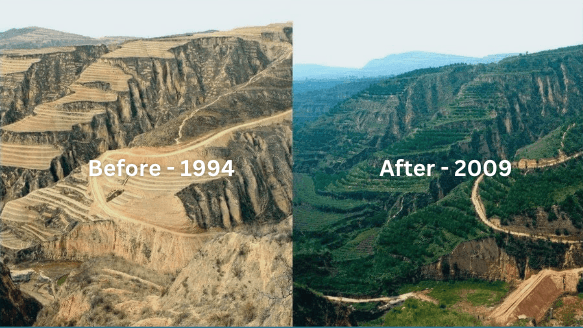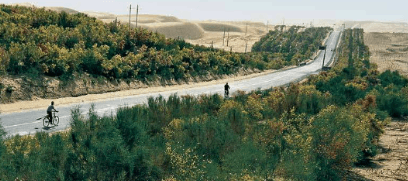Lessons from China: how the UAE can conserve its soils
)
The prognosis is alarming: the UN warns that within the next 60 years, the planet’s remaining arable topsoil will vanish, leading to an estimated one billion people becoming refugees because of soil desertification by 2050.
This stark reality underscores the urgent need for sovereign leaders and investors alike to prioritise initiatives aimed at reversing desertification, which will help to ensure internal food security and groundwater replenishment.
This is not just about navigating impending migration crises, it’s about securing a healthy society and a stable economic future.
While the challenge of soil regeneration and counteracting desertification on a grand scale is formidable, it is not insurmountable. Urgent action is required but there is hope if humanity acts now.
The UAE has a brief window to emerge as a pioneer in resurrecting agricultural vitality within its desert expanses, drawing inspiration from successful cases such as the transformation of China’s Loess Plateau, documented by the filmmaker and ecologist John D. Liu.
The transformation of the Loess Plateau from a barren desert into fertile farmland stands as a compelling testament to what determined action to reverse desertification can achieve.
Over the course of a decade, this community-led effort transformed 35,000 square kilometres of desert land roughly the size of Belgium into productive agricultural ground, and significantly improved the socio-economic status of millions.
The region, once plagued by poverty and hunger, became a beacon of agricultural prosperity, enabling its residents to pursue education and improved livelihoods beyond the mere struggle for survival.

John D. Liu
China’s Loess Plateau, as documented by the filmmaker and ecologist John D. Liu
This success story offers vital lessons for the UAE, grappling with rising temperatures, food insecurity, and water scarcity.
By embracing regenerative agricultural practices, the UAE can rehabilitate its land and soil, and drive economic growth and carbon drawdown, improve air quality, enhance biodiversity, and boost societal peace and stability.
Future job creation and economic opportunities could cover sectors such as ecosystem restoration services, agriculture, textiles, the carbon industry and ecotourism.
The UAE has a brief window to emerge as a pioneer in resurrecting agricultural vitality within its desert expanses
Another case study documented by John D. Liu, the Xinjiang project’s “Great Green Wall” in China, illustrates the potential of ecosystem-based adaptation strategies.
Planting salt-tolerant species along the Taklimakan Desert highway’s edges curbed desert expansion, improved climate conditions, and enhanced biodiversity, another compelling model for the UAE.
Liu reported: “The Taklimakan Desert Research Station measured surface temperatures of 70C (158F) on the desert sand. At the same time, [there were] measured temperatures of 25C (77F) below the vegetative shelter belt on both sides of the road.”

John D. Liu
The Xinjiang project’s Great Green Wall
Liu observed that local residents were able to harvest a prized ingredient in traditional Chinese medicine, cistanche, on site, thereby contributing to funding the upkeep of the corridor’s vegetation.
Similarly, the Saudi Green Initiative, introduced by Saudi Arabia in 2021, is a comprehensive effort to address climate change and advance environmental restoration, with a focus on afforestation. It is implementing its ambitious goal of planting 10 billion trees across the kingdom by 2030.
Investing in the reversal of desertification through soil regeneration promises widespread benefits beyond mere conservation. It is a pivotal opportunity for the UAE to champion true sovereign economic development and environmental stewardship.
Embracing the lessons from China’s success stories would help the UAE to set a benchmark for converting arid landscapes into vibrant ecosystems at scale, contributing significantly to the global effort against desertification and climate change.
Erin Grover is based in Dubai and advises on emerging technologies for climate impact, food security and supply chain transparency.
Tune into our Let's Chew Podcast Episode with Erin Grover to hear more...
